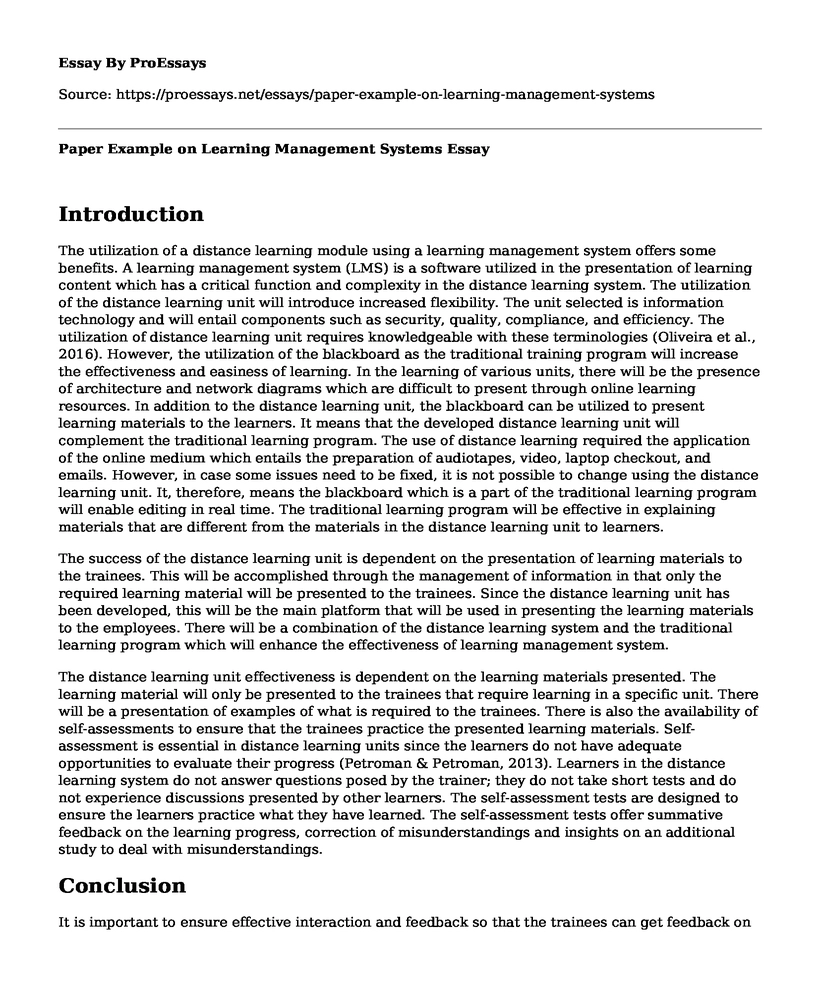Introduction
The utilization of a distance learning module using a learning management system offers some benefits. A learning management system (LMS) is a software utilized in the presentation of learning content which has a critical function and complexity in the distance learning system. The utilization of the distance learning unit will introduce increased flexibility. The unit selected is information technology and will entail components such as security, quality, compliance, and efficiency. The utilization of distance learning unit requires knowledgeable with these terminologies (Oliveira et al., 2016). However, the utilization of the blackboard as the traditional training program will increase the effectiveness and easiness of learning. In the learning of various units, there will be the presence of architecture and network diagrams which are difficult to present through online learning resources. In addition to the distance learning unit, the blackboard can be utilized to present learning materials to the learners. It means that the developed distance learning unit will complement the traditional learning program. The use of distance learning required the application of the online medium which entails the preparation of audiotapes, video, laptop checkout, and emails. However, in case some issues need to be fixed, it is not possible to change using the distance learning unit. It, therefore, means the blackboard which is a part of the traditional learning program will enable editing in real time. The traditional learning program will be effective in explaining materials that are different from the materials in the distance learning unit to learners.
The success of the distance learning unit is dependent on the presentation of learning materials to the trainees. This will be accomplished through the management of information in that only the required learning material will be presented to the trainees. Since the distance learning unit has been developed, this will be the main platform that will be used in presenting the learning materials to the employees. There will be a combination of the distance learning system and the traditional learning program which will enhance the effectiveness of learning management system.
The distance learning unit effectiveness is dependent on the learning materials presented. The learning material will only be presented to the trainees that require learning in a specific unit. There will be a presentation of examples of what is required to the trainees. There is also the availability of self-assessments to ensure that the trainees practice the presented learning materials. Self-assessment is essential in distance learning units since the learners do not have adequate opportunities to evaluate their progress (Petroman & Petroman, 2013). Learners in the distance learning system do not answer questions posed by the trainer; they do not take short tests and do not experience discussions presented by other learners. The self-assessment tests are designed to ensure the learners practice what they have learned. The self-assessment tests offer summative feedback on the learning progress, correction of misunderstandings and insights on an additional study to deal with misunderstandings.
Conclusion
It is important to ensure effective interaction and feedback so that the trainees can get feedback on what they practice. The appropriate interaction and feedback strategies ensure the identification of trainees' needs and provision of a forum for the suggestion of necessary improvements. Some of the ways that the trainees will get feedback include e-mail, video conferencing and personal visits when feasible (Pinantoan, 2013). It will ensure the trainees obtain necessary feedback concerning their development.
References
Oliveira, P., Cunha, C., & Nakayama, M. (2016). Learning Management Systems (LMS) and e-learning management: an integrative review and research agenda. Journal of Information Systems and Technology Management, 13(2), 157-180. doi: 10.4301/s1807-17752016000200001
Petroman, C., & Petroman, I. (2013). Improving the development of learning materials for open and distance learning. Procedia- Social and Behavioral Sciences, 83, 295-299.
Pinantoan, A. (2013). Conducting Distance Education Effectively - InformED. Retrieved from https://www.opencolleges.edu.au/informed/teacher-resources/resources-for-distance-education/
Cite this page
Paper Example on Learning Management Systems. (2022, Jun 19). Retrieved from https://proessays.net/essays/paper-example-on-learning-management-systems
If you are the original author of this essay and no longer wish to have it published on the ProEssays website, please click below to request its removal:
- Term Paper on Management - Advantages of Scenario Planning
- Components of a Business Plan Paper Example
- Ingredients of Effective Leadership Paper Example
- Essay Sample on Promoting Health & Reducing Risk: Basics of Community/Public Health
- Teamwork and Collaboration for Better Healthcare
- Essay Sample on Organizational Culture: Communicating Company Norms to Staff
- Essay Example on Kitchen Essential Products Inc.: Ensuring Safety & Quality Through Duty Of Care







